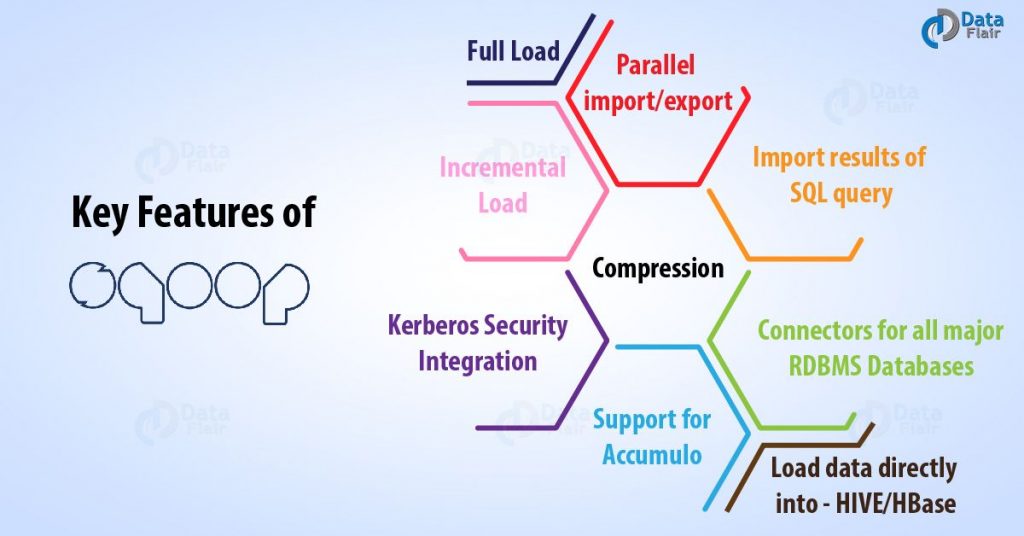Apache Sqoop is a tool in the Hadoop ecosystem have several advantages. Like Sqoop can load the whole table through the single command, it offers fault tolerance on top of parallelism and many more. In this tutorial on Key Features of Sqoop, several advantages of Sqoop are discussed which will give you the answer for – Why you should learn Apache Sqoop? Also, we will learn its brief introduction first to understand it well.
Introduction to Apache Sqoop
- A tool which we use for data transfer between RDBMS and Hadoop is what we call Sqoop. Here, RDBMS refers to MySQL, Oracle SQL etc, whereas Hadoop refers to Hive, HDFS, and HBase and many more.
- To be more specific, we use Sqoop to import data from RDBMS to Hadoop. Also to export data from Hadoop to RDBMS.
- Again Sqoop is one of the top projects by Apache software foundation and works brilliantly with relational databases such as Teradata, Netezza, Oracle, MySQL, and Postgres etc.
Key Features of Sqoop
There are many salient features of Sqoop, which shows us the several reasons to learn sqoop.
a. Parallel import/export
While it comes to import and export the data, Sqoop uses YARN framework. Basically, that offers fault tolerance on top of parallelism.
b. Connectors for all major RDBMS Databases
However, for multiple RDBMS databases, Sqoop offers connectors, covering almost the entire circumference.
c. Import results of SQL query
Also, in HDFS, we can import the result returned from an SQL query.
d. Incremental Load
Moreover, we can load parts of table whenever it is updated. Since Sqoop offers the facility of the incremental load.
e. Full Load
It is one of the important features of sqoop, in which we can load the whole table by a single command in Sqoop. Also, by using a single command we can load all the tables from a database.
f. Kerberos Security Integration
Basically, Sqoop supports Kerberos authentication. Where Kerberos defined as a computer network authentication protocol. That works on the basis of ‘tickets’ to allow nodes communicating over a non-secure network to prove their identity to one another in a secure manner.
g. Load data directly into HIVE/HBase
Technology is evolving rapidly!
Stay updated with DataFlair on WhatsApp!!
Basically, for analysis, we can load data directly into Apache Hive. Also, can dump your data in HBase, which is a NoSQL database.
h. Compression
By using deflate(gzip) algorithm with –compress argument, We can compress your data. Moreover, it is also possible by specifying –compression-codec argument. In addition, we can also load compressed table in Apache Hive.
i. Support for Accumulo
It is possible that rather than a directory in HDFS we can instruct Sqoop to import the table in Accumulo.
Conclusion
However, we have seen all the key features of Sqoop, which shows the reasons to learn sqoop, with exploring advantages of sqoop. Still, if you want to ask any query, feel free to ask through the comment section.
See Also-
Sqoop Eval & Sqoop Validation
For reference
